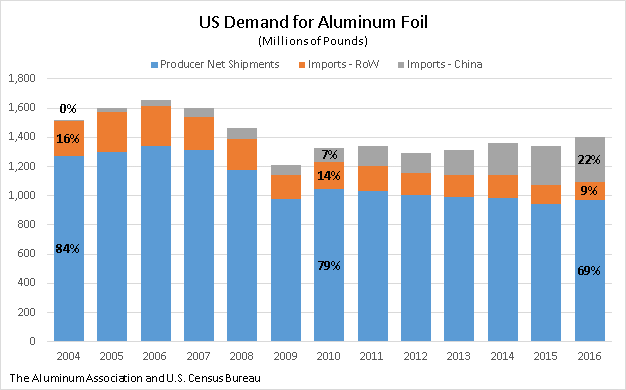The Aluminum Association’s Trade Enforcement Working Group filed antidumping and countervailing duty petitions charging that unfairly traded imports of certain aluminum foil from the People’s Republic of China are causing material injury to the domestic industry. This action is part of the U.S. aluminum industry’s broad trade strategy to address Chinese overcapacity throughout the value chain.
“Today’s action marks the first time the Aluminum Association has filed unfair trade cases on behalf of its members in its nearly 85-year history,” said Heidi Brock, president & CEO of the Aluminum Association. “This unprecedented action reflects both the intensive injury being suffered by U.S. aluminum foil producers and also our commitment to ensuring that trade laws are enforced to create a level playing field for domestic producers.”
The antidumping margins alleged by the domestic industry range from 38% to more than 134% of the value of the imported aluminum foil. The domestic industry’s countervailing duty petition alleges that Chinese producers benefit from 27 separate government subsidy programs. The petitions were filed concurrently with the United States Department of Commerce and the United States International Trade Commission (USITC) and apply to aluminum foil that is used in a variety of consumer and industrial applications. Specific uses include household foil, flexible and semi-rigid cookware, product packaging, automotive, and HVAC heat exchangers, among other common uses.

The domestic industry filed its petitions for relief in response to large and increasing volumes of low-priced imports of aluminum foil from China that have injured U.S. producers. Twelve years ago, U.S. production accounted for about 84% of all domestic aluminum foil demand and today that has dropped to 69%. At the same time, Chinese imports grew from essentially 0% of the total U.S. aluminum foil market in 2004 to 22% of the market today. Aluminum foil imports from China have grown by nearly 40% since 2014. In 2016, Chinese products accounted for about 71% of the total U.S. aluminum foil imports.
“Surging imports of unfairly low-priced aluminum foil from China have devastated pricing in the U.S. market and caused severe injury to the domestic industry,” added John M. Herrmann, of Kelley Drye & Warren LLP, the petitioner’s trade counsel. “The domestic industry looks forward to the opportunity to present its case to the Commerce Department and U.S. International Trade Commission to obtain relief from unfairly traded imports from China and to restore fair competition in the U.S. market.”
Chinese foil imports have accounted all of the import growth over the past three years, meaning that in addition to capturing market share from U.S. producers, imports from China also captured market share from third country producers. As a result of this unfair competition, the domestic industry has suffered declines in production, sales, hours worked by employees, prices, revenues, and profits — and also has been forced to either close facilities or take actions to reduce capacity.
The petition alleges that Chinese producers have injured the domestic industry by selling their aluminum foil at unfairly low prices that significantly undercut domestic market prices. Chinese producers have massive capacity to produce aluminum foil and have been exporting large and increasing volumes of unfairly low-priced and subsidized merchandise to the U.S. that have devastated conditions in the U.S. market, according to the Association. Those price declines are likely to continue to hurt U.S. producers if duties are not imposed to level the playing field.
Antidumping duties are intended to offset the amount by which a product is sold at less than fair value, or “dumped,” in the U.S. The margin of dumping is calculated by the Commerce Department. Estimated duties in the amount of the dumping are collected from importers at the time of importation. Countervailing duties are intended to offset unfair subsidies that are provided by foreign governments and benefit the production of a particular good. The USITC, an independent agency, will determine whether imports of aluminum foil from China are a cause of, or threaten, material injury to the domestic industry.
As a result of the filing of the petitions, the Commerce Department will determine whether to initiate the antidumping and countervailing duty investigations within 20 days and the USITC will reach a preliminary determination of material injury or threat of material injury within 45 days. The entire investigative process will take approximately one year, with final determinations of dumping, subsidization, and injury likely occurring in the first quarter of 2018.
The aluminum foil subject to the unfair trade petitions includes all imports from China of aluminum foil that is less than 0.2 mm in thickness (less than 0.0078 inches) in reels weighing more than 25 lbs and that is not backed, etched for use in capacitors, or cut to shape.
The petitioners are represented in these actions by John M. Herrmann, Paul C. Rosenthal, Kathleen W. Cannon, and Grace W. Kim of the law firm Kelley Drye & Warren LLP.
